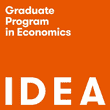-
- PhD Program
- Posted 4 days ago
PhD in Economics
Starts 1 Oct at CERGE-EI in Prague, Czechia
-
- Master's Program
- Posted 1 week ago
Master in Economic Research
Starts 1 Oct at CERGE-EI in Prague, Czechia
-
- Master's Program
- Posted 1 week ago
Master in Statistics, Data Intelligence, and the Foundations of the Sciences
Starts 15 Sep at Università Politecnica delle Marche in Ancona, Italy
-
- PhD Program, Program, PhD Candidate Job
- Posted 3 weeks ago
Doctoral programme in Economics and Finance -Call for applications for 2025/2026 entry 9 Fully - funded PhD Scholarships
At Department of Economics and Management, University of Trento in Trento, Italy
-
- Master's Program
- Posted 4 weeks ago
Master’s in Economics with Data Science
at University of Alicante in Alicante, Spain
-
- Master's Program
- Posted 1 month ago
Master of Science in Applied Economics
at University of Neuchâtel in Neuchâtel, Switzerland
-
- PhD Program, Program, Postgraduate Scholarship
- Posted 1 month ago
7 fully-funded PhD positions in Economics, Analytics and Decision Sciences (EADS) at the IMT School for Advanced Studies
Starts 1 Nov at IMT School for Advanced Studies Lucca in Lucca, Italy
-
- Master's Program
- Posted 1 month ago
MSc Applied Economics
Starts 29 Sep at University of Bath in Bath, United Kingdom
-
- PhD Program
- Posted 1 month ago
Fully funded PhD positions in Economics and Management
at Department of Economics and Management, University of Padua in Padova, Italy
-
- Master's Program
- Posted 1 month ago
Master Economics for Smart Cities and Climate Policy
Starts 7 Sep at Ecole Polytechnique in Palaiseau, France -
- MBA Program
- (Online)
- Posted 1 month ago
Online MBA in Data Science
at Henderson State University in Arkadelphia, United States
-
- Master's Program
- Posted 2 months ago
Master Data and Economics for Public Policy - Ecole polytechnique/ENSAE Paris/Télécom Paris
Starts 1 Sep at Ecole Polytechnique in Palaiseau, France -
- PhD Program
- Posted 3 months ago
9 PhD Positions in the Research Training Group 2865 “CUDE”
Starts 1 Oct at University of Bielefeld in Bielefeld, Germany -
- Master's Program
- Posted 2 months ago
MSc Finance
Starts 1 Sep at Tilburg University in Tilburg, Netherlands -
- PhD Program
- Posted 3 months ago
PhD in Aerospace Engineering
at Universidad Carlos III de Madrid in Madrid, Spain
-
- Master's Program
- Posted 3 months ago
Masters in Applied Data Science and Analytics
Starts 1 Apr at SRH University -
- Master's Program
- Posted 3 months ago
Master of Science in Big Data
Starts 7 Jan at La Salle LLull University in Barcelona, Spain -
- Master's Program
- Posted 4 months ago
MSc/PhD in Economics (IDEA) - Barcelona
Starts 1 Sep at Universitat Autònoma de Barcelona in Spain
-
- PhD Program, Master's Program
- Posted 4 months ago
PhD in Economics / Master in Economic Analysis- University of Cyprus
Starts 25 Aug at University of Cyprus in Nicosia, Cyprus -
- PhD Program
- Posted 5 months ago
PhD Programme in Economics (with optional M.Sc. Economic Research)
Starts 1 Oct at University of Cologne and Universität zu Köln, WiSo-Fakultät and Cologne Graduate School in Management, Economics and Social Sciences in Köln, Germany -
- Master's Program
- Posted 5 months ago
Master (MSc) in Behavioural Economics - University of Cyprus
Starts 1 Sep at University of Cyprus in Nicosia, Cyprus -
- Master's Program
- Posted 4 months ago
MSc Data Science in Business and Entrepreneurship
Starts 1 Sep at Tilburg University in Tilburg, Netherlands -
- Master's Program
- Posted 5 months ago
Research Master in Economics
Starts 1 Sep at Tilburg University in Tilburg, Netherlands -
- Master's Program
- Posted 6 months ago
MSc Data Science and Society
Starts 1 Sep at Tilburg University in Tilburg, Netherlands -
- Master's Program
- Posted 11 months ago
MSC DATA SCIENCE, AI, AND DIGITAL BUSINESS
Starts 1 Oct at Gisma University of Applied Sciences in Berlin, Germany
Pagination







